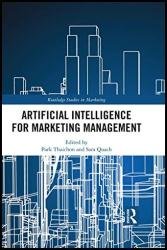Artificial Intelligence for Marketing Management
- Добавил: literator
- Дата: 16-09-2022, 13:53
- Комментариев: 0
 Название: Artificial Intelligence for Marketing Management
Название: Artificial Intelligence for Marketing ManagementАвтор: Park Thaichon, Sara Quach
Издательство: Routledge
Год: 2023
Страниц: 218
Язык: английский
Формат: pdf (true)
Размер: 17.7 MB
Artificial Intelligence (AI) has driven businesses to adopt new business practices rapidly, enhance product development and services, has helped to power AI-based market intelligence and customer insights, and improve customer relationship management. This timely book addresses the use of AI in marketing.
This book also explores the dark side of AI in marketing management and discusses ethics and transparency of automated decision-making in AI applications, data privacy, cyber security issues, and biases in various facets of marketing. Emerging applications of AI such as DeepFakes which use deep learning technology could increase risks of manipulation and deception. Hence, apart from leveraging AI capabilities and advantages, the book cautions the need for prevention strategies to deal with potential issues that could arise from the adoption of AI in marketing management.
Machine Learning (ML) is a vast and rapidly evolving feld, encompassing a wide range of methods for addressing diverse tasks. ML is based on the notion that a computer system can learn on its own from a set of data, find out the data’s patterns, and then make decisions with very little human intervention. ML-based systems are capable of carrying out a vast range of complex tasks such as building search engines, fltering content on social media or in emails, making recommendations on websites, traffc prediction, stock market trading, medical diagnosis, and so on. There are five main tasks of ML: Supervised learning, unsupervised learning, semi-supervised learning, reinforcement learning, and active learning.
Deep Learning (DL) is a subset of machine learning, involving algorithms that can learn deep, direct belief networks one layer at a time, provided the top two layers forman indirect associative memory. Those belief networks are called “artifcial neural networks” (ANNs) or “deep neural networks.” The term “deep” specifically refers to the number of hidden layers in neural networks. Deep learning uses multiple neural networks to process large amounts of data to learn their complex patterns and imitate human minds. Neural networks contain three layers: an input layer, a hidden layer, and an output layer. Altogether, these layers contain thousands, sometimes millions of nodes. Deep learning systems can think the way a human thinks to interpret the environment and act accordingly to solve the problems.
How artifcial intelligence (AI) has been transforming marketing practices? Let’s consider the following example: Claire is planning for her summer holiday. She goes online and searched for beach destinations for her trip. The next day, she sees some hotel advertisements when browsing YouTube; one of them is a gorgeous resort in the Maldives, her dream place to visit. She goes to the company’s website and its Facebook page and has a chat with the company about when is the best time to stay at the resort and available services/options for her. Then, she visits Tripadvisor and Booking.com to read customer reviews of this resort. From that day, she is frequently exposed to more advertisements on that resort on social media (from Facebook to Instagram), as well as fights and travel options to the Maldives, other items for a beach vacation (i.e., dresses, suitcases, and sunglasses). All these recommendations are very helpful for her in planning her trip and make her so excited. Finally, after receiving a special coupon by email, she decides to buy the fight tickets, book the resort, and buy lots of stuff to be used on her coming trip. When arriving interested in the resort, she happily shares her experiences on social media and attracts lots of interest from her friends on her posts.
Based on the earlier example, it can be seen that AI has been transforming marketing practices even though it may be unknown to customers. Claire’s journey has been guided by sophisticated AI systems. First, her search results are generated by the Google ranking system to show the most suitable information for her account, determined partly by advertisers’ bids. Next, the content of the website has been customized on the basis of her sign-in profle and in fact, an automated chatbot is utilized to answer her questions. Also, the customer reviews she reads are ordered in the most helpful way by an evaluation algorithm embedded in the third-party company’s website (i.e., Tripadvisor, Booking.com). The coupon delivered by email is personally generated by the company’s pricing engine. The advertisements are shown to her repeatedly using targeting/retargeting algorithms via real-time bidding. Claire’s feedback on social media is also tracked by social listening engines and later used for sentiment analysis, allowing the company to detect changes in customer satisfaction, preference, and brand image.
This book will provide practical insights into the role of AI in marketing management. It will be a useful reference for those researching marketing and marketing professionals.
Скачать Artificial Intelligence for Marketing Management
[related-news] [/related-news]
Внимание
Уважаемый посетитель, Вы зашли на сайт как незарегистрированный пользователь.
Мы рекомендуем Вам зарегистрироваться либо войти на сайт под своим именем.
Уважаемый посетитель, Вы зашли на сайт как незарегистрированный пользователь.
Мы рекомендуем Вам зарегистрироваться либо войти на сайт под своим именем.
